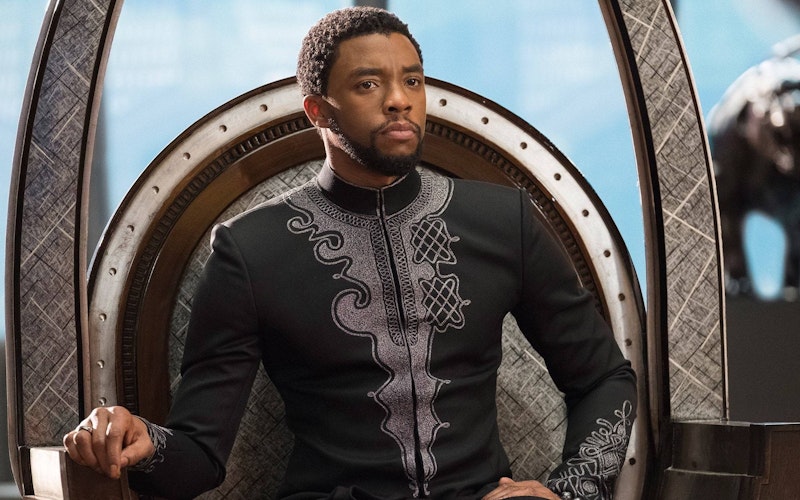
Movies
Four Crucial Questions Raised by Black Panther
Black Panther has already become a phenomenon within and beyond the Marvel Cinematic Universe. The story chronicles the ascension of King T’Challa (Chadwick Boseman) to the throne of the fictional African nation of Wakanda upon the death of his father. In this new role he faces challenges from within himself and from the world outside, challenges he must meet if he is to fulfill the traditional role of Black Panther, protector of the nation.
Having seen the film twice, I’ve been reflecting on a number of pertinent questions it raises. One of these is literally asked at the close of the film when a child says to T’Challa, “Who are you?” Throughout Black Panther, T’Challa finds himself deeply concerned with who he is supposed to be as the new king of Wakanda. While he is confident as a man of action wearing the sleek Black Panther suit, he is less sure of what is the best way to rule his country. One striking scene takes place in the “ancestral plane,” where T’Challa briefly reunites with his late father. “It is hard for a good man to be a king,” his father warns him. While his father is dressed in traditional attire, T’Challa wears white, suggesting a new day, a new era, full of the unknown.
“Who am I?” “Who are we?” Though very few of us will be in a role like T’Challa’s, the question is still one we face each day. In our consumerist society, identity is often linked to what we possess. We’re told we are not enough unless we buy the latest item, each one an additional brick in an edifice we believe we must build in order to be someone. I often wonder about the identity formation of Christians in a society like ours. How can we best remember the vital truths God has revealed about our identity as image bearers, priests, and gifted members of God’s family? What role do our churches play in helping us face the many identity crises throughout our congregations?
A related question arises from the scene in which T’Challa learns of an event that reveals a flaw in his father’s legacy (I’ll say no more to avoid spoilers). This type of moment is not unique to T’Challa. Many of us have had to ask what it means to steward a legacy, especially when we discover “complications.” Whether it is in families, churches, nations—or with revered figures from history—we all have those days of reckoning where we are reminded that every human has clay feet. I will never forget when I had to contend with the racism of Abraham Kuyper. This was a major crisis for me because I had become excited about his work as an influential theologian. When these crises arrive, the path of faithfulness is not the erasure of the bad. We need to lament and properly critique these dimensions of darkness, but we also need to take these matters as lessons in our own frailty and susceptibility to the lingering effects of depravity. The frailty of our forebears should keep us from making idols of the past, while also being vigilant to pass on the best contributions that came before us. This is also the challenge that lies before T’Challa.
While T'Challa is confident as a man of action, he is less sure of the best way to rule his country.
A central element of the Black Panther story is vibranium, a material that lies beneath Wakanda and powers the country’s advanced technology. Its glow gives a sense of its potency. Vibranium is a secret unknown to those outside Wakanda, and so another question is whether Wakanda should share this power with the wider world or keep it hidden. One can see the virtue of Wakanda remaining a secret utopia, but equally intriguing would be the transformations of life and society that vibranium would bring. In a sense this is a question of stewardship. God’s creation is full of potential that continues to amaze us. For some, the goodness of the earth is a pathway to wealth, power, and influence—even dominance. To share that goodness with others is a risk. Wakanda will expose itself by going public with this resource, but as a Christian I see such a risk as a matter of stewardship.
A final question is posed by Black Panther’s villain, Erik Killmonger (Michael B. Jordan). Having experienced racism and oppression outside of Wakanda, Killmonger seeks vibranium as a means to global revolution. Trained in combat and highly intelligent, he’s a formidable opponent with righteous motivations. Even as we root against his methods, he forces us to ask, “What do we do in the face of legitimate anger and pain?” From his sneers to his scars, Killmonger displays an intimate acquaintance with pain. While Killmonger’s strategy is not consonant with the way God will bring justice to all in the end—director Ryan Coogler even turns the camera upside down at one point to evoke his villain’s distorted scheme—the church cannot ignore the legitimate cries of those living in the wake of horrors. Theological shoulder shrugs are sub-Christian.
Given all of the provocative questions it raises, Black Panther is more than just another Marvel superhero movie. It is also a catalyst for Christian thought and action.
Topics: Movies